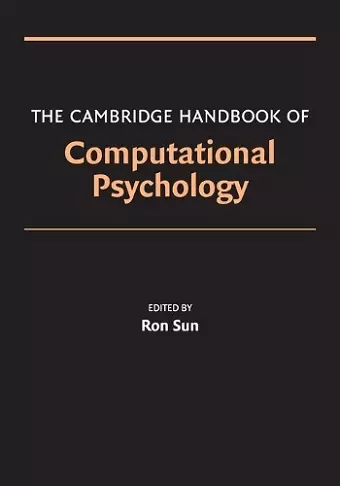The Cambridge Handbook of Computational Psychology
Format:Paperback
Publisher:Cambridge University Press
Published:28th Apr '08
Currently unavailable, and unfortunately no date known when it will be back

A cutting-edge reference source for the interdisciplinary field of computational cognitive modeling.
A definitive reference source for the growing, increasingly more important, and interdisciplinary field of computational cognitive modeling. Ron Sun summarizes and explains the basic concepts, techniques and findings for a major topic, sketches its history, assesses its successes and failures, giving a sense of the directions research is currently heading.This book is a definitive reference source for the growing, increasingly more important, and interdisciplinary field of computational cognitive modeling, that is, computational psychology. It combines breadth of coverage with definitive statements by leading scientists in this field. Research in computational cognitive modeling explores the essence of cognition and various cognitive functionalities through developing detailed, process-based understanding by specifying computational mechanisms, structures, and processes. Given the complexity of the human mind and its manifestation in behavioral flexibility, process-based computational models may be necessary to explicate and elucidate the intricate details of the mind. The key to understanding cognitive processes is often in fine details. Computational models provide algorithmic specificity: detailed, exactly specified, and carefully thought-out steps, arranged in precise yet flexible sequences. These models provide both conceptual clarity and precision at the same time. This book substantiates this approach through overviews and many examples.
"[...] This edited volume by Sun (Rensselaer Polytechnic Institute) comprises two sections:[...] The first section will attract broader interest, especially from students, because of its juxtaposition of distinct approaches including connectionist, Bayesian, and logical modeling. The second section covers a range of topics, from memory and learning to decision making and cognitive control. [...] Given that the application chapters are largely independent of the methodological chapters, a dedicated instructor could cover more extensive ground by selecting primary papers on a desired topic. However, researchers who use computational approaches, or who want to become better consumers of computational psychology literature, may find this to be a valuable compilation of major ideas in this area. Recommended. --S.A. Huettel, Duke University CHOICE
"--With the publication of The Cambridge Handbook of Computational Psychology, the newly emerging, interdisciplinary field of computational cognitive modeling has come of age...a cutting-edge overview of classic and current work in computational psychology. This handbook stakes out this important and promising area of cognitive science...a definitive reference source for the rapidly growing, increasingly important, and strongly interdisciplinary field of computational cognitive modeling...The Cambridge Handbook of Computational Psychology represents a milestone, marking a number of important contributions to the larger field of cognitive science." --Howard T. Everson, PsycCRITIQUES [May 20, 2009, Vol. 54, Release 20, Article 5]
ISBN: 9780521674102
Dimensions: 254mm x 178mm x 34mm
Weight: 1310g
768 pages